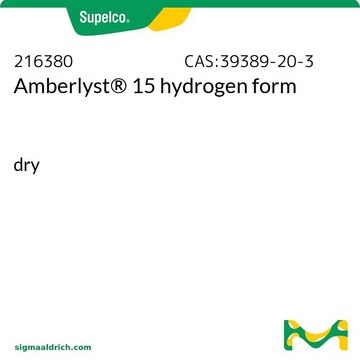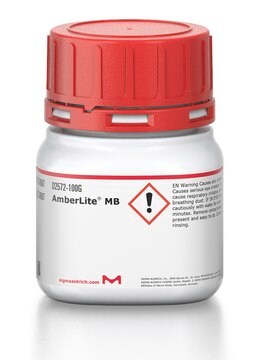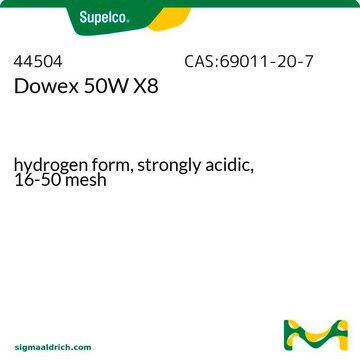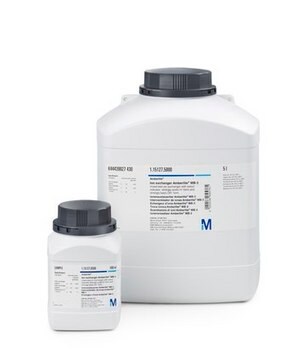436712
Amberlyst® 36 Ion Exchange Resin
16-50 mesh
About This Item
Productos recomendados
Nombre del producto
Amberlyst® 36, total pore volume 0.20 mL/g
Formulario
beads
Nivel de calidad
reticulante
12 % cross-linked
contiene
51-57% Moisture content (H+ form)
composición
water, 55%
técnicas
LPLC: suitable
superficie
33 m2/g
Matriz
styrene divinylbenzene (macroporous)
grupo activo de la matriz
sulfonic acid functional group
tamaño de partícula
<0.425 mm (0.5% max)
0.600-0.850 mm (uniformity coefficient: <1.6)
>1.180 mm (4.0% max)
tamaño de poro
0.20 mL/g total pore volume
240 Å average pore diameter
capacidad
>1.95 eq/L exchange capacity
>5.40 meq/g exchange capacity
densidad
1.2 g/mL at 25 °C (lit.)
técnica de separación
cation exchange
cadena SMILES
[S](=O)(=O)(O)c2c(cccc2)C=C.c1(c(cccc1)C=C)C=C
InChI
1S/C10H10.C8H8O3S/c1-3-9-7-5-6-8-10(9)4-2;1-2-7-5-3-4-6-8(7)12(9,10)11/h3-8H,1-2H2;2-6H,1H2,(H,9,10,11)
Clave InChI
SIWVGXQOXWGJCI-UHFFFAOYSA-N
Categorías relacionadas
Descripción general
Water to phenol: 45%
Water to dry: 54%
Aplicación
- Synthesis of renewable diesel and jet fuel range alkanes using 2-methylfuran and cyclohexanone.: This study explores a method for producing renewable diesel and jet fuel from biomass-derived compounds using Amberlyst® 36 as a catalyst, highlighting its potential for sustainable fuel production (Sun et al., 2022).
- Kinetic Study on Esterification of Acetic Acid with Isopropyl Alcohol Catalyzed by Ion Exchange Resin.: The research investigates the kinetics of esterification reactions catalyzed by Amberlyst® 36, providing insights into its efficiency and applicability in producing esters used in various industrial applications (Liu et al., 2019).
- Pretreatment of bio-oil with ion exchange resin to improve fuel quality and reduce char during hydrodeoxygenation upgrading with Pt/C.: This paper discusses the use of Amberlyst® 36 in the pretreatment of bio-oil to enhance its quality as a precursor for sustainable fuel, demonstrating the resin′s effectiveness in removing impurities that affect fuel refinement processes (Oh et al., 2021).
- Hydrolysis of Lipid-Extracted Chlorella vulgaris by Simultaneous Use of Solid and Liquid Acids.: The study examines the hydrolysis of algae-derived lipids using a combination of Amberlyst® 36 and other acids, showcasing its potential to facilitate biofuel production from microalgae (Seon et al., 2019).
- Valorization of lignocellulosic fibres of paper waste into levulinic acid using solid and aqueous Brønsted acid.: This research demonstrates the role of Amberlyst® 36 in converting paper waste into valuable chemicals like levulinic acid, contributing to waste valorization and chemical recycling (Chen et al., 2018).
Información legal
Código de clase de almacenamiento
11 - Combustible Solids
Clase de riesgo para el agua (WGK)
WGK 3
Punto de inflamabilidad (°F)
Not applicable
Punto de inflamabilidad (°C)
Not applicable
Equipo de protección personal
dust mask type N95 (US), Eyeshields, Gloves
Elija entre una de las versiones más recientes:
¿Ya tiene este producto?
Encuentre la documentación para los productos que ha comprado recientemente en la Biblioteca de documentos.
Los clientes también vieron
Nuestro equipo de científicos tiene experiencia en todas las áreas de investigación: Ciencias de la vida, Ciencia de los materiales, Síntesis química, Cromatografía, Analítica y muchas otras.
Póngase en contacto con el Servicio técnico









